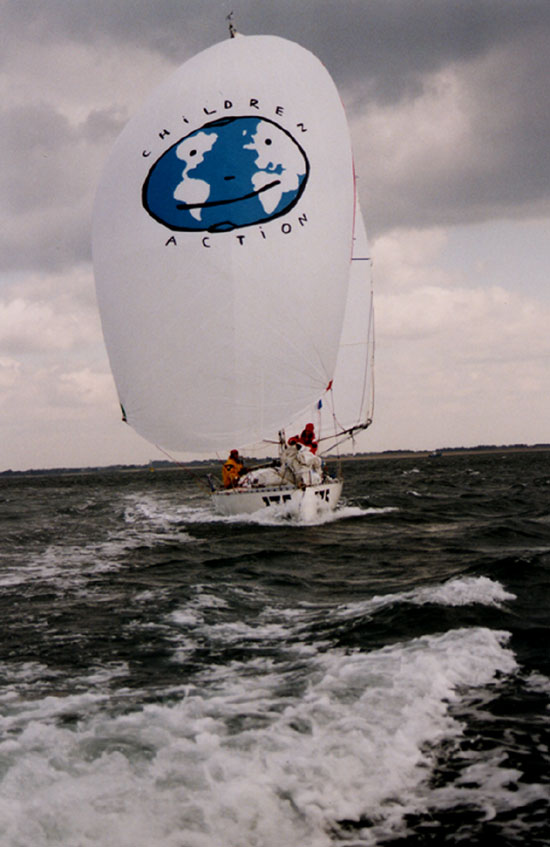|
       



 
 
|
|
Tuesday
25 september
It
has been 3 days since the Minis left La Rochelle. After
a Force 7 during the first 48 hours, the skippers faced
a lack of wind. The sailors did encounter extreme conditions
in a really short period of time.
Hervé
is today in 6t position. It seems that today the wind will
come back. This is good because in the conditions encountered,
it is really difficult to leave the helm. However, you need
some time to rest (even 20 minutes) . And this is why some
time the skippers lose some places.
The
avaries are quite important. 3 boats have yet dismasted
( Paul Peggs and Roland Guerin ) but as Denis Hugues, the
director of the race says: A boat leaves with a maximum
of potential, and then she destroys herself slowly.
With
Hervé, we prepared for the length of the race, differents
texts about some frequently asked questions. After the strategy,
here is now something about  the
SEA SICKNESS. the
SEA SICKNESS.
Everybody can become sea sick but it is very often a sickness
that the skippers hide as if it was a very disgraceful sickness.
Actually there is a really scientific explanation that Dr
Chauve gives in his book “Instants de Vie” on
the skippers of the Vendée Globe:
“The best way to fight this phenomenon is to understand
it. There is therefore a simple explanation which will certainly
not satisfy the specialist even if it is very near to the
truth. The evolution from monkey to man went through a decisive
phase when man started to stand. However this position was
acquired only after the development of a control system
of balance particularly performance. There are also some
other less important cultural systems where the eyes, the
muscles and certain ligaments play an important role.
In order to imagine the action of the receptors of the balance
of the internal ear, we can compare them to a builder’s
spirit level. This level is made of small bubbles moving
in the tube full of water. The level is horizontal when
the bubble is in the middle of the tube.
When we move, the bubble is moving as well due to the movements
of the body also moves in the bulb. If we imagine that inside
this bulb are a lot of minuscule electrodes, when it moves
the bubble touches some of them which record this contact
and transmit this to the brain via the nerves.
Therefore thanks to the movement of the bubbles (they are
in each ear three bulbs) the brain receives permanently
information on the position of the body. Some other information
on the situation of the body in space also comes to the
brain from other receptors as described before (eyes, muscles,
etc.). Working then as a computer, the brain integrates
all this data, quantifies it and compares it instantly and
without even being aware of it the brain sends orders of
contraction or relaxation to some muscles which will in
almost every case prevent the body falling.
The functioning of this system is very long and complex
as standing is a perpetual provocation to the rules of balance
and gravity.
But when you are at sea, everything is more complicated
as the ground is not a stable reference but more a perpetual
movement. Even when you are in a fixed position (like when
sitting down or lying) the body moves all the time and accompanies
the boat’s movements. As a consequence, the bubbles
are moving, the electrodes of the bulb inform the brain
that there is a movement. At the same time, the other receptors
indicate that the body is motionless on the seat or on the
berth. Whom should the brain believe? This is a real headache
for the brain which is confronted with these unexpected
contradictions. It is impossible for it to elaborate a consistent
answer to maintain the verticality of the body, especially
when the muscles are having a rest and are generally relaxed.
During this time, the bubbles continue to stimulate the
electrodes of the bulb which sends with consistency nervous
information to the brain which really doesn’t know
what to do with it. The nervous charges increasing there
is something that needs to be done to get rid of it. No
other choice than to use the CTZ “chemo-receptive Trigger
Zone” which in exiting the centre of vomiting triggers
its answer which is sometimes shy sometimes enthusiastic.
Then after a while, the brain adapts itself by not considering
information coming from the bubbles as significant. This
is a relief when the body gets accustomed to the sea movement.
You can then live on board without choking”.
Does Herve suffer from sea sickness? Usually, he can stand
it quite well but it also happens once when he was going
around the Isle of Wight alone at night to find him lying
over the leeward holding the life line…
|
|



